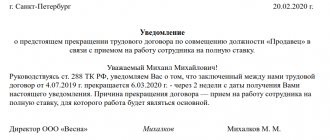We'll tell you how the dismissal process actually works, what rights an employer has, and what you can demand from an employee so as not to get problems from the labor inspectorate.
- How does dismissal happen?
- A working period of two weeks: what does it mean?
- Exceptions to the rules for dismissal at will
- How a manager resigns
- Dismissal under a fixed-term contract or from seasonal work
- Dismissal during the probationary period
- Dismissal for violation of labor duties
How does dismissal happen?
The basic rules for terminating an employment contract are set out in Chapter. 13 Labor Code of the Russian Federation. The general procedure for formalizing the termination of a contract is regulated by Art. 84.1 Labor Code of the Russian Federation. To fire an employee, you need to issue an order; you can use a template.
The date of termination of the contract is the last day of work, including in a situation where the employee was absent, but he retained his job.
On the day of dismissal, you are obliged to issue the employee a work book, and if this is not possible, send him a notice of the need to obtain the document. You also need to submit a certificate of income and a certificate of insurance experience, pay the employee and, if he wishes, issue him other documents, for example, information about his work activity. The date and reason for dismissal are entered into the work book, copying the wording from the Labor Code of the Russian Federation and making reference to a specific paragraph or part of the article.
These rules apply to all reasons for dismissal.
What other payments are possible?
Upon dismissal, the employee must be given all the funds adopted by the regulations of this organization. These could be allowances, bonuses, compensation, etc.:
- for experience;
- for qualifications;
- for maintaining work secrets;
- for the successful completion of important assignments;
- for work in difficult conditions;
- incentive payments, etc.
The procedure for calculating these payments must be prescribed in the relevant internal regulations.
NOTE! An employer who violates the terms and procedure or the amount of calculation of payments required by law risks receiving administrative liability (Article 236 of the Labor Code of the Russian Federation).
A working period of two weeks: what does it mean?
All possible grounds for termination of an employment contract are specified in Art. 77 Labor Code of the Russian Federation. Among others, there is dismissal at will - it is regulated by a separate article. 80 Labor Code of the Russian Federation. The period of 2 weeks is indicated in this article.
But to say that this is a work-out is incorrect. The code states that an employee can terminate the contract at his own request, but to do this he must notify the employer in writing at least 2 weeks in advance. The start of the period will be the day following the submission of the application.
This does not mean that a person must necessarily work the specified period. He can take vacation, time off or sick leave for this time - the deadline will run, the paid job must be saved, but in fact there is no work. If the vacation lasts more than two weeks, then the last day of work will be considered the last day of vacation. If an employee is on sick leave, but there is a letter of resignation, then he must be fired on the 14th day of sick leave.
10 examples of unusual dismissals and court decisions
In any of the 14 days before dismissal, the employee can withdraw his application. Then it is impossible to dismiss him at his own request without a repeated application.
Situation 1: an employee quit, didn’t get a job, and a week later went on sick leave
Who pays the benefit
Sick leave is paid if the insured event occurred when the person was employed and within 30 calendar days after dismissal (Clause 5 of Federal Law No. 255-FZ of December 29, 2006). The first three days are paid by the employer, now a former one, the rest is paid by the Social Insurance Fund (clause 3, 255-FZ). This rule applies to sick leave listed in Part Art. 5 255-ФЗ:
- sick leave due to illness or injury;
- patient care;
- quarantine of the insured person or his child;
- prosthetics;
- aftercare.
A former employee can apply for such benefits within 6 months from the date of restoration of working capacity or establishment of disability (clause 5, clause 12 of the 255-FZ).
In case an employee got another job, but did not tell you about it, you can take a statement from him confirming that at the time of going on sick leave he was not working anywhere. If it later turns out that this is not so, the FSS will have claims against the employee, and not against the company.
If your situation is different, the Standard. They will answer you within 24 hours - in detail and with links to laws.
How do we calculate benefits?
We make the calculation based on 60% of average earnings. The employee's insurance length is not taken into account (Part 7, 255-FZ).
On June 1, Vasily left the company after working for 12 years. On June 5 he was on sick leave. His benefit was calculated based on 60% of his earnings, although his insurance coverage was more than 8 years.
How do we reflect such benefits in accounting?
After an employee quits, payments must be made to account 76 “Settlements with various debtors and creditors”, and not 70.
Since the employee is no longer involved in the main activities of the company, his benefit is not related to the sale of goods, provision of services or performance of work (clause 5 of PBU 10/99). This means that the costs can be attributed to other expenses (clause 12 of PBU 10/99).
Accounting records are prepared:
- calculation of benefits - Dt 91.2 Kt 76;
- personal income tax calculation - Dt 76 Kt 68;
- payment of benefits - Dt 76 Kt 51 (50).
How to fill out the FSS register
When creating the Register of Information, in column 32 you need to indicate code 47 (Appendix No. to the FSS Order No. 26 dated 02/04/2021). In the field of the certificate of incapacity for work “Calculation conditions”, code 47 is also indicated.
How to fill out the “Calculation conditions” field on sick leave for a dismissed employee
Exceptions to the rules for dismissal at will
If an employee terminates an employment contract of his own free will, there are three reasons why he may not wait until the end of the two-week period. They are indicated in the same article. 80 Labor Code of the Russian Federation.
Agreement of the parties
If the employer does not mind, termination can be issued at the request of the employee earlier. Regulates the agreement process Art. 78 Labor Code of the Russian Federation.
There is no unified form of agreement between the parties - the employee and the employer draw up it in free form (sample agreement). But it is understood that the agreement means a peaceful order, that is, the parties agree on all the nuances of termination, including the timing of dismissal and the amount of compensation payments.
Inability to continue working
The Labor Code allows not to notify the employer two weeks in advance if the employee needs to resign due to enrollment in an educational organization or due to retirement.
Violations by the employer
In para. 3 tbsp. 80 of the Labor Code of the Russian Federation states that if an employer violates the norms of the Labor Code or the terms of the contract, then the employee has the right to resign at his own request without a two-week warning.
Convenient service for calculating salaries, sick leave and vacation pay, sending reports via the Internet
There is a nuance. In Art. 142 of the Labor Code of the Russian Federation specifies the procedure for an employee to act in case of non-payment of wages - if the employer delays it for more than 15 days, the employee can suspend work. If at the same time you submit an application for resignation of your own free will, and the downtime period lasts just more than two weeks, then you will actually not have to work out this period, the contract will be terminated.
Dismissal under a fixed-term contract or from seasonal work
In Art. 292 of the Labor Code of the Russian Federation states that an employee with an employment contract for a period of up to two months (fixed-term contract) is obliged to notify the employer of the desire to end the relationship at least 3 calendar days in advance.
A fixed-term contract can be concluded not for a specific date, but on a condition - for example, while the employee whose job is being retained is absent. For example, this is done when it is necessary to replace the functions of an employee during maternity leave. The employee notifies the employer of his desire to resign 3 days in advance. If the employee returns, then the colleague replacing him does not need to work out anything - the employment contract is terminated on the same day.
Convenient tools for recording personnel events, generating orders and other documents
If the employment contract is concluded for seasonal work, the notice period is similar - 3 calendar days. They do this in writing. The process is regulated by Art. 296 Labor Code of the Russian Federation.
Dismissal during the probationary period
According to Art. 71 of the Labor Code of the Russian Federation, if the employee has not yet completed the probationary period, he can terminate his employment at will. To do this, he submits an application to the employer, even without a reason for dismissal. This must be done 3 calendar days before the date of termination of the contract. The basis for termination of the relationship will be “termination of the employment contract at the initiative of the employee.”
The employer can also terminate the contract. In this case, the employee must be warned about the unsatisfactory result of the probationary period. To do this, the employee is sent a notice indicating the reasons for non-compliance, no later than 3 days before the date of termination of the contract. The employee has the right to appeal the termination in court, so during the probationary period it is necessary to monitor possible problems in labor functions and discipline and record them using memos or acts.
The probationary period cannot last longer than three months, and for managers and their deputies of an organization or its separate divisions, branches and representative offices - no longer than six months.
Dismissal for violation of labor duties
If an employee does not want to wait two weeks, but writes a letter of resignation and simply stops going to work, then these actions are regarded as a gross violation of labor obligations, on the basis of Part 6 of Art. 81 Labor Code of the Russian Federation.
To terminate an employment contract, it is sufficient that the employee is absent from the workplace without a valid reason for more than four hours in a row. To prevent an employee from appealing your decision after dismissal, you need to collect witness testimony or otherwise prove his absence, and also send the employee a letter demanding to explain why he did not come to work.
The problem is that if it comes to dismissal for absenteeism, the employee is unlikely to agree to such a development. And he will be able to prove that he was absent for a good reason - for example, due to an emergency in the apartment, a visit to the doctor, an urgent call to school. An employee can try to challenge the termination of a contract for absenteeism, including through court.
As a result, the process will take longer than the 2 weeks specified in the law. Therefore, if an employee wants to leave of his own free will, but does not want to work, it is easier to let him go by agreement of the parties. Or if you are not ready to act peacefully, engage a labor law specialist to study the nuances of a specific situation.
Briefly about when an employee can quit without working
- The concept of “working off” is legally incorrect. The law obliges the employee, in case of voluntary dismissal, to give notice 2 weeks in advance. But this does not mean that he has to serve this term.
- You can go on sick leave or vacation for these 2 weeks.
- Or negotiate with management and resign by agreement of the parties.
- You still don’t have to work if you can’t continue working. For example, in connection with retirement or enrollment in an educational institution.
- There is no need to give 2 weeks notice of dismissal if the employer violates labor standards. When an employer does not pay wages for more than 15 days, the employee can suspend work and, in addition, apply for resignation. There is no need to work during downtime.
- There is an exception to the 2 week rule. For example, when a manager or deputy resigns, you need to give a month’s notice.
- If an employee quits during the probationary period, notice must be given 3 days in advance. A similar period applies in the case of a fixed-term contract or a contract for seasonal work.
- If an employee does not want to work for 2 weeks, he can simply not come to work. In this case, the employer has the right to try to fire him for absenteeism. But such a decision will be canceled if the employee provides valid reasons for absenteeism. Therefore, it is easier to negotiate or let the employee go without two weeks of work.
Features of “severance” calculations
Let's consider the features of calculating different types of payments due to an employee upon his resignation at his own request.
How to formalize voluntary dismissal during the probationary period ?
Payroll calculation
When leaving, the employee must receive all the money he earned for the actual time worked.
FOR YOUR INFORMATION! As with a regular salary, the employer withholds the required tax from this payment - personal income tax.
The amount is calculated based on the salary or tariff. This is easy to do if the last month worked was full. If the dismissal occurs after working for less than a month, the accounting department needs to calculate the amount due for handout. To do this, the due amount for a full month must be divided by the number of working days in this month, thus calculating the average daily earnings for this period, and then multiply the resulting figure by the number of days actually worked by the employee.
Znep.month = O / RD x OD
Where:
- Znep.month – salary due for an incomplete month worked;
- О – employee’s salary;
- RD – working days in the month of calculation;
- OD – days worked by the resigning employee.
EXAMPLE OF CALCULATION
Economist Buslaeva P.K., who worked with a salary of 40 thousand rubles/month, decided to quit on August 24, 2021, for which she submitted a corresponding application on August 10. According to the production calendar in August 2021 there were 21 working days. It turns out that Buslaeva P.K. will work 16 days in August. How much salary is she entitled to?
Let's calculate the average daily August earnings of Buslaeva P.K.: 40,000 / 21 = 1904 rubles. 70 kopecks Now let’s multiply it by the time she actually worked: 1904.7 x 16 = 30,476 rubles. 19 kopecks
Calculation for unused vacation days
This payment is mandatory if during the year of dismissal the employee did not have time to go on legal leave or did not fully use the days allotted for rest. To calculate the amount due, you will need data on earnings during the last year: on their basis, the amount due for payment for 1 vacation day is calculated. This indicator is then multiplied by the number of days “not taken off” by the resigning employee.
Kotp. = DG / 12 / 29.3 x Nod
Where:
- Kotp. – vacation compensation;
- DG – employee’s income for the year, including salary, bonuses and allowances;
- 12 – number of months in a year;
- 29.3 – average monthly number of days accepted for calculations according to the Labor Code of the Russian Federation;
- Nod – unused vacation days.
EXAMPLE OF CALCULATION
Let's continue to use data for retiring economist P.K. Buslaeva. She is entitled to a standard vacation of 28 days, which she has not yet taken in 2021 until August. Buslaeva has been working in the company for more than a year, so the calculation will be made based on data for the previous 12 months. She receives a salary of 40 thousand rubles. for the last six months, before that her salary was 35 thousand rubles, in addition, for the New Year she received a bonus of 5 thousand rubles. Let's calculate the compensation she is entitled to for her vacation.
Buslaeva’s total income for the past year will be 35,000 x 6 + 40,000 x 6 + 5,000 = 210,000 + 240,000 + 5,000 = 455,000 rubles. Let's divide this amount by 12 months to find the average monthly earnings: 455,000 / 12 = 37,916 rubles. Now we divide by the average number of days in a month: 37,916 / 29.3 = 1,294 rubles. All that remains is to multiply by the number of vacation days allocated but not used by Buslaeva: 1294 x 28 = 36,233 rubles.







